译林版(2020) 必修第三册 Unit 2 Natural Disasters Grammar and usage Grammar课件(29张)
文档属性
| 名称 | 译林版(2020) 必修第三册 Unit 2 Natural Disasters Grammar and usage Grammar课件(29张) |

|
|
| 格式 | pptx | ||
| 文件大小 | 4.6MB | ||
| 资源类型 | 教案 | ||
| 版本资源 | 牛津译林版(2019) | ||
| 科目 | 英语 | ||
| 更新时间 | 2022-04-07 00:00:00 | ||
图片预览

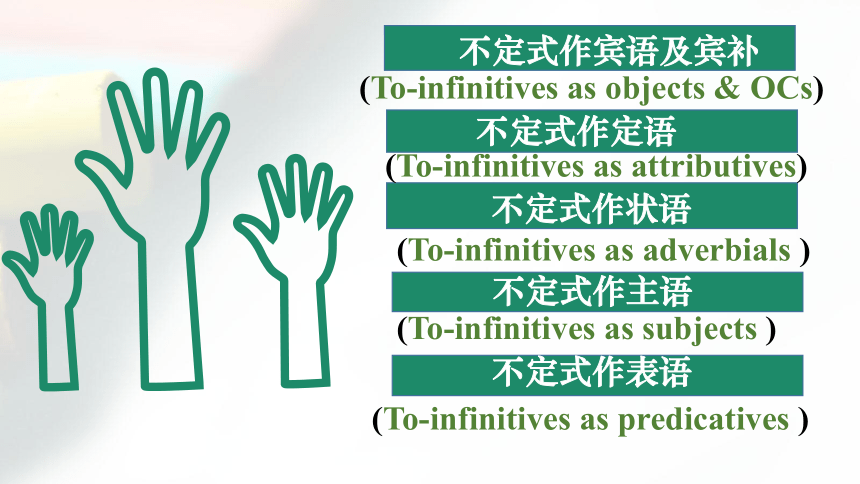
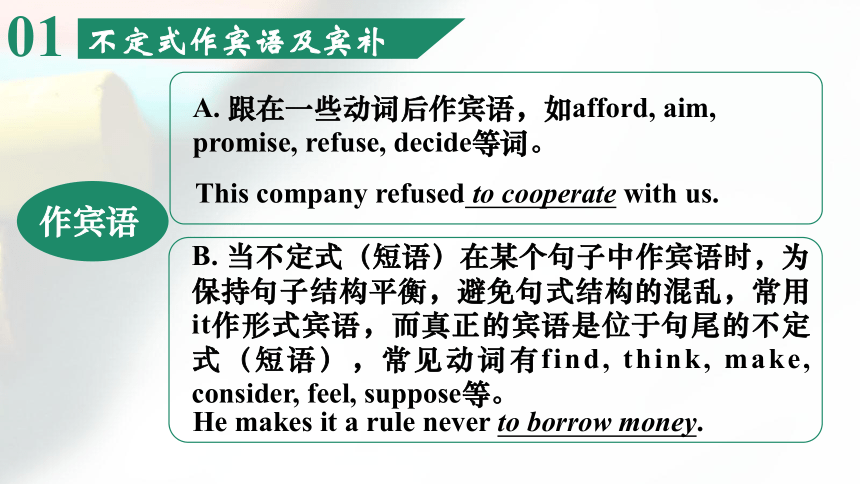
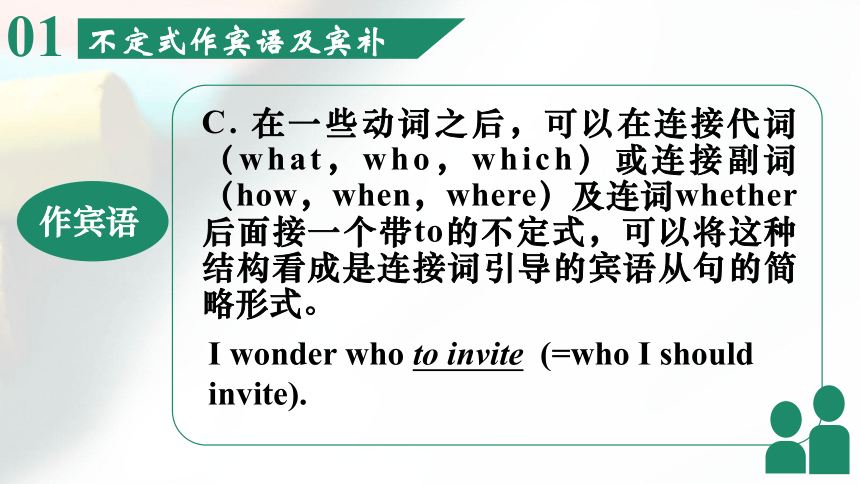
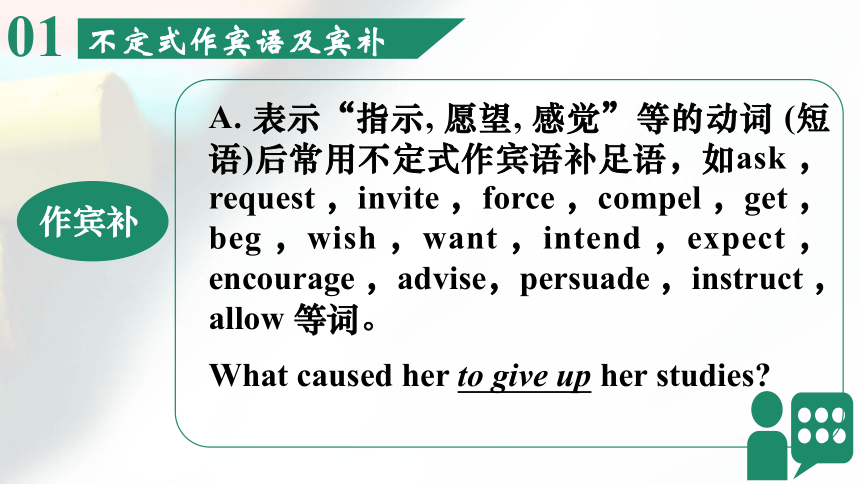
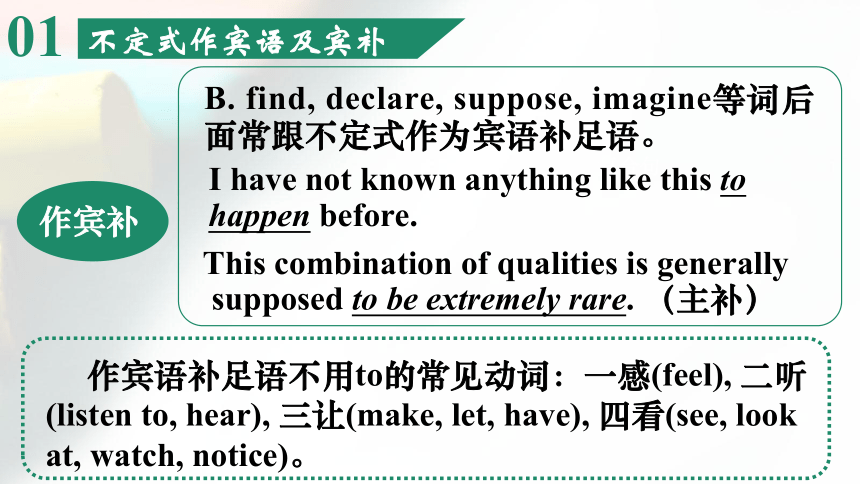
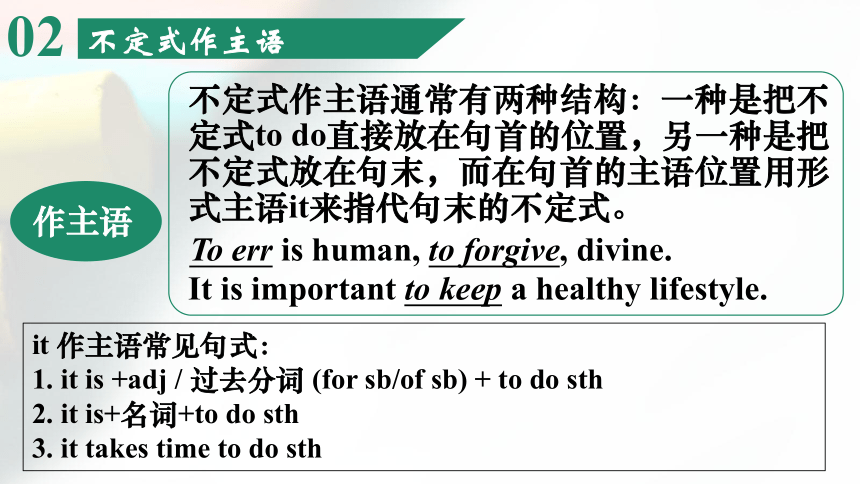
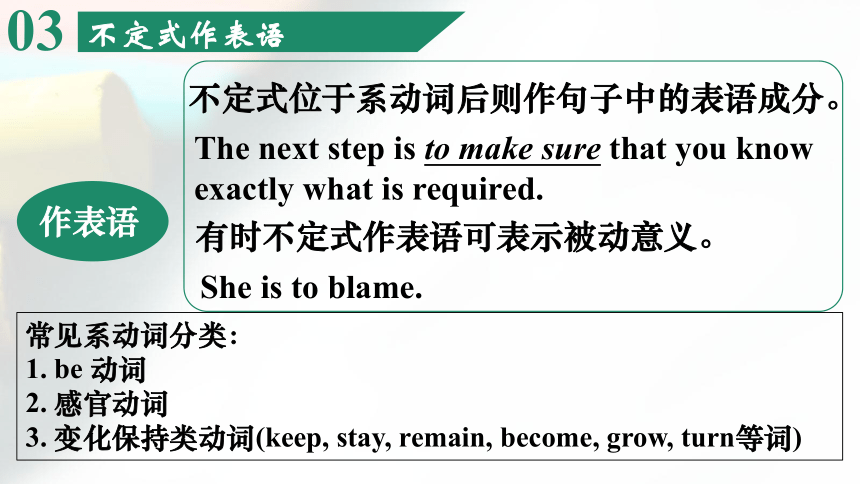

文档简介
(共29张PPT)
不定式作定语
不定式作状语
不定式作主语
(To-infinitives as subjects )
(To-infinitives as adverbials )
(To-infinitives as attributives)
不定式作宾语及宾补
(To-infinitives as objects & OCs)
不定式作表语
(To-infinitives as predicatives )
01
This company refused to cooperate with us.
不定式作宾语及宾补
A. 跟在一些动词后作宾语,如afford, aim, promise, refuse, decide等词。
作宾语
B. 当不定式(短语)在某个句子中作宾语时,为保持句子结构平衡,避免句式结构的混乱,常用it作形式宾语,而真正的宾语是位于句尾的不定式(短语),常见动词有find, think, make, consider, feel, suppose等。
He makes it a rule never to borrow money.
I wonder who to invite (=who I should invite).
复合句
C. 在一些动词之后,可以在连接代词(what,who,which)或连接副词(how,when,where)及连词whether后面接一个带to的不定式,可以将这种结构看成是连接词引导的宾语从句的简略形式。
01
不定式作宾语及宾补
作宾语
What caused her to give up her studies
复合句
A. 表示“指示, 愿望, 感觉”等的动词 (短语)后常用不定式作宾语补足语,如ask ,request ,invite ,force ,compel ,get ,beg ,wish ,want ,intend ,expect ,encourage ,advise,persuade ,instruct ,allow 等词。
01
不定式作宾语及宾补
作宾补
This combination of qualities is generally
supposed to be extremely rare. (主补)
复合句
B. find, declare, suppose, imagine等词后面常跟不定式作为宾语补足语。
I have not known anything like this to happen before.
作宾语补足语不用to的常见动词:一感(feel), 二听(listen to, hear), 三让(make, let, have), 四看(see, look at, watch, notice)。
01
不定式作宾语及宾补
作宾补
不定式作主语通常有两种结构:一种是把不定式to do直接放在句首的位置,另一种是把不定式放在句末,而在句首的主语位置用形式主语it来指代句末的不定式。
It is important to keep a healthy lifestyle.
To err is human, to forgive, divine.
it 作主语常见句式:
1. it is +adj / 过去分词 (for sb/of sb) + to do sth
2. it is+名词+to do sth
3. it takes time to do sth
02
不定式作主语
作主语
不定式位于系动词后则作句子中的表语成分。
The next step is to make sure that you know exactly what is required.
常见系动词分类:
1. be 动词
2. 感官动词
3. 变化保持类动词(keep, stay, remain, become, grow, turn等词)
有时不定式作表语可表示被动意义。
She is to blame.
03
不定式作表语
作表语
To-infinitives as attributives and adverbials of result
A Exploring the rules
Anna is interviewing her teacher, Mr Li, about his experiences during a hurricane. Find the sentences with to-infinitives and fill in the table below. The first ones have been done for you.
Anna: Mr Li, I heard you experienced a strong hurricane when you were attending a conference in the United States. Can you tell me about it
Mr Li: Sure. I was staying in Atlanta, and that was one of the cities to be hit.
Anna: Did you know that the hurricane was coming
P20
Mr Li: Yes. That morning, I turned on the TV for some local news, only to hear that a hurricane was on its way. As you can imagine, it was a bit of a shock.
Anna: What did you do during the hurricane
Mr Li: The roads were blocked, so there was nothing for me to do but stay inside. You know, going outside during a hurricane is much too dangerous.
Anna: Exactly. How did you feel during the hurricane
Mr Li: The strong wind and heavy rain didn’t scare me, but I was quite frightened during the power failure.
P20
Anna: Were you afraid of running out of supplies
Mr Li: Actually, no. I had enough food and water to last a whole week!
Anna: That was lucky! What did the streets look like after the hurricane
Mr Li: When the wind and rain stopped, I looked out of the window, only to see huge trees lying across the street and water everywhere!
Anna: The hurricane must have caused a lot of damage and suffering.
Mr Li: Yes. Luckily, many people came to help, donating food and clothes to charities.
P20
To-infinitives as attributives To-infinitives as adverbials of result
I was staying in Atlanta, and that was one of the cities to be hit. That morning, I turned on the TV for some local news, only to hear that a hurricane was on its way.
... I looked out of the window, only to see huge trees lying across the street and water everywhere!
The roads were blocked, so there was nothing for me to do but stay inside.
I had enough food and water to last a whole week!
P20
Working out the rules
When the to-infinitive is used as an attributive, it is often put (1) ________ (before/after) the noun or pronoun it modifies.
When the to-infinitive is used as an adverbial of result, it can refer to an (2) ____________ (expected/unexpected) result. In this case, we often use only before the to-infinitive.
after
unexpected
动词不定式与其所修饰的词之间往往有动宾关系,如果该不定式是由不及物动词构成,或者该不定式本身有宾语,其后应有必要的介词。
He wants water to drink.
She has a child to take care of.
There is not a moment to lose.
His eagerness to get back home was quite obvious.
She is always the first to answer questions.
He left on a cold morning,without anyone to see him off.
不定式作主语
04
不定式作定语
不定式作定语时与被修饰词之间的逻辑关系
1
2
3
主谓关系(subject-verb)
Clint was the second person to survive in the earthquake.
动宾关系(verb-object)
Wise men speak because they have something to say;
fools because they have to say something.
同位语关系(apposition)
The need to love and to be loved is universal.
作目的状语(可位于句首或句尾)
I went there to see my teacher.
作结果状语(有时可表示意料之外的结果)
The box was too heavy to move.
作原因状语
He is sad to hear the bad news.
不定式作主语
05
不定式作状语
KKL Page 33
动词不定式
作定语和结果状语
only to do 结构 表示意外的结果
He hurried to the station, only to find the train had left.
他匆匆忙忙赶往车站,结果却发现火车已经离开了。
He worked hard, only to fail at last.
他努力工作,最终结果却失败了。
She returned only to find that no one was at home.
她回到家,才发现家里没有一个人。
Practice makes perfect
判断不定式在下列句子中作何成分
1.I went to the annual earthquake workshop to learn some safety tips.
2. The authorities told the local people to stay inside when the typhoon arrived.
3. They arrived at the airport only to find the flight had been cancelled due to the snowstorm.
4. Before we returned home, the flood damage needed to be repaired
5. This was the last city to be cleared of people before the volcano erupted.
1. 作目的状语;2. 作宾语补足语;3. 作结果状语;4. 作宾语;5. 作定语
This afternoon, I went to the school library (1)________________________________________.
At 3 p.m., I arrived at Mr Li’s office, only (2)__________________________ . Just then, I saw a note from Mr Li on the office door saying he was in the meeting room. I went there and we talked about his experiences during a strong hurricane. Mr Li described the hurricane in great detail. He also mentioned a charity event to raise funds for the disaster area. Our interview ended at 3:50 p.m. because Mr Li had a staff meeting (3) ___________ at 4 p.m. Next I went through my notes of Mr Li’s experiences and at 5 p.m. I went to the school computer room (4)__________________________________.
to find books about hurricanes
to find he was not in the office
to attend
to make PPT slides for my project
P21
B3
Jim is talking to his friend Julie about this experience after the earthquake. In pairs, complete the conversation below using to-infinitives.
Julie: I heard the earthquake in your city was terrible. Did you move to a safe place
Jim: Yes. My neighborhood (1) __________________ _______. People from other neighborhoods followed later.
Julie: Is it true that the emergency services provided everyone with sleeping bags
Jim: Yes. They did this (2) ______________________.
Julie: Did you miss home
was actually the first
to leave
to keep us warm
P21
attributive
adverbial of purpose
Jim: Yes, I did. I (3) ___________________________ __________, but I had to wait three weeks before it was safe to go back.
Julie: What did your home look like when you returned
Jim: I came home (4) __________________________. Nothing was left in one piece.
Julie: I’m sorry to hear that. Did the authorities give you any advice
Jim: Yes. They (5) ____________________________ ________________________________________.
to find it completely destroyed
advised us to take an active part in the rebuilding
wanted to return home as soon as possible
object
adverbial of result
object complement
根据汉语意思提示完成下列句子
1. 不要逃避问题,要想成功,你得学会应对难题。
Don't avoid the problem. _________, you have to rise to the difficulties.
2. 我匆忙赶到家,结果发现所有的家具都被洪水冲走了。
I hurried home, _______________________ had been washed away by the flood.
3. 这箱子太沉了,我挪都挪不动。
This box is too heavy ___________________.
To succeed; 2. only to find all my furniture;
3. for me to move it
按要求改写下列句子
1. We cannot stop natural disasters but we can arm ourselves with knowledge. In this way, we can make full preparations for disasters. (用不定式作状语)
We cannot stop natural disasters but we can arm ourselves with knowledge (so as) to make full preparations for disasters.
2. The kids were very calm. They can protect themselves during the earthquake.(用不定式作状语)
The kids were calm enough to protect themselves during the earthquake.
用不定式作状语改写下列句子
3. Follow the proper safety procedures so that you can protect yourself from a typhoon. (用不定式作状语)
4. You should prepare at least three days of food and drinking water. (用不定式作定语)
To protect yourself from a typhoon, follow the proper safety procedures.
You should prepare food and drinking water to last at least three days.
Homework
KKL Page 34-35 + 落实必考的语段背诵
Thank you
不定式作定语
不定式作状语
不定式作主语
(To-infinitives as subjects )
(To-infinitives as adverbials )
(To-infinitives as attributives)
不定式作宾语及宾补
(To-infinitives as objects & OCs)
不定式作表语
(To-infinitives as predicatives )
01
This company refused to cooperate with us.
不定式作宾语及宾补
A. 跟在一些动词后作宾语,如afford, aim, promise, refuse, decide等词。
作宾语
B. 当不定式(短语)在某个句子中作宾语时,为保持句子结构平衡,避免句式结构的混乱,常用it作形式宾语,而真正的宾语是位于句尾的不定式(短语),常见动词有find, think, make, consider, feel, suppose等。
He makes it a rule never to borrow money.
I wonder who to invite (=who I should invite).
复合句
C. 在一些动词之后,可以在连接代词(what,who,which)或连接副词(how,when,where)及连词whether后面接一个带to的不定式,可以将这种结构看成是连接词引导的宾语从句的简略形式。
01
不定式作宾语及宾补
作宾语
What caused her to give up her studies
复合句
A. 表示“指示, 愿望, 感觉”等的动词 (短语)后常用不定式作宾语补足语,如ask ,request ,invite ,force ,compel ,get ,beg ,wish ,want ,intend ,expect ,encourage ,advise,persuade ,instruct ,allow 等词。
01
不定式作宾语及宾补
作宾补
This combination of qualities is generally
supposed to be extremely rare. (主补)
复合句
B. find, declare, suppose, imagine等词后面常跟不定式作为宾语补足语。
I have not known anything like this to happen before.
作宾语补足语不用to的常见动词:一感(feel), 二听(listen to, hear), 三让(make, let, have), 四看(see, look at, watch, notice)。
01
不定式作宾语及宾补
作宾补
不定式作主语通常有两种结构:一种是把不定式to do直接放在句首的位置,另一种是把不定式放在句末,而在句首的主语位置用形式主语it来指代句末的不定式。
It is important to keep a healthy lifestyle.
To err is human, to forgive, divine.
it 作主语常见句式:
1. it is +adj / 过去分词 (for sb/of sb) + to do sth
2. it is+名词+to do sth
3. it takes time to do sth
02
不定式作主语
作主语
不定式位于系动词后则作句子中的表语成分。
The next step is to make sure that you know exactly what is required.
常见系动词分类:
1. be 动词
2. 感官动词
3. 变化保持类动词(keep, stay, remain, become, grow, turn等词)
有时不定式作表语可表示被动意义。
She is to blame.
03
不定式作表语
作表语
To-infinitives as attributives and adverbials of result
A Exploring the rules
Anna is interviewing her teacher, Mr Li, about his experiences during a hurricane. Find the sentences with to-infinitives and fill in the table below. The first ones have been done for you.
Anna: Mr Li, I heard you experienced a strong hurricane when you were attending a conference in the United States. Can you tell me about it
Mr Li: Sure. I was staying in Atlanta, and that was one of the cities to be hit.
Anna: Did you know that the hurricane was coming
P20
Mr Li: Yes. That morning, I turned on the TV for some local news, only to hear that a hurricane was on its way. As you can imagine, it was a bit of a shock.
Anna: What did you do during the hurricane
Mr Li: The roads were blocked, so there was nothing for me to do but stay inside. You know, going outside during a hurricane is much too dangerous.
Anna: Exactly. How did you feel during the hurricane
Mr Li: The strong wind and heavy rain didn’t scare me, but I was quite frightened during the power failure.
P20
Anna: Were you afraid of running out of supplies
Mr Li: Actually, no. I had enough food and water to last a whole week!
Anna: That was lucky! What did the streets look like after the hurricane
Mr Li: When the wind and rain stopped, I looked out of the window, only to see huge trees lying across the street and water everywhere!
Anna: The hurricane must have caused a lot of damage and suffering.
Mr Li: Yes. Luckily, many people came to help, donating food and clothes to charities.
P20
To-infinitives as attributives To-infinitives as adverbials of result
I was staying in Atlanta, and that was one of the cities to be hit. That morning, I turned on the TV for some local news, only to hear that a hurricane was on its way.
... I looked out of the window, only to see huge trees lying across the street and water everywhere!
The roads were blocked, so there was nothing for me to do but stay inside.
I had enough food and water to last a whole week!
P20
Working out the rules
When the to-infinitive is used as an attributive, it is often put (1) ________ (before/after) the noun or pronoun it modifies.
When the to-infinitive is used as an adverbial of result, it can refer to an (2) ____________ (expected/unexpected) result. In this case, we often use only before the to-infinitive.
after
unexpected
动词不定式与其所修饰的词之间往往有动宾关系,如果该不定式是由不及物动词构成,或者该不定式本身有宾语,其后应有必要的介词。
He wants water to drink.
She has a child to take care of.
There is not a moment to lose.
His eagerness to get back home was quite obvious.
She is always the first to answer questions.
He left on a cold morning,without anyone to see him off.
不定式作主语
04
不定式作定语
不定式作定语时与被修饰词之间的逻辑关系
1
2
3
主谓关系(subject-verb)
Clint was the second person to survive in the earthquake.
动宾关系(verb-object)
Wise men speak because they have something to say;
fools because they have to say something.
同位语关系(apposition)
The need to love and to be loved is universal.
作目的状语(可位于句首或句尾)
I went there to see my teacher.
作结果状语(有时可表示意料之外的结果)
The box was too heavy to move.
作原因状语
He is sad to hear the bad news.
不定式作主语
05
不定式作状语
KKL Page 33
动词不定式
作定语和结果状语
only to do 结构 表示意外的结果
He hurried to the station, only to find the train had left.
他匆匆忙忙赶往车站,结果却发现火车已经离开了。
He worked hard, only to fail at last.
他努力工作,最终结果却失败了。
She returned only to find that no one was at home.
她回到家,才发现家里没有一个人。
Practice makes perfect
判断不定式在下列句子中作何成分
1.I went to the annual earthquake workshop to learn some safety tips.
2. The authorities told the local people to stay inside when the typhoon arrived.
3. They arrived at the airport only to find the flight had been cancelled due to the snowstorm.
4. Before we returned home, the flood damage needed to be repaired
5. This was the last city to be cleared of people before the volcano erupted.
1. 作目的状语;2. 作宾语补足语;3. 作结果状语;4. 作宾语;5. 作定语
This afternoon, I went to the school library (1)________________________________________.
At 3 p.m., I arrived at Mr Li’s office, only (2)__________________________ . Just then, I saw a note from Mr Li on the office door saying he was in the meeting room. I went there and we talked about his experiences during a strong hurricane. Mr Li described the hurricane in great detail. He also mentioned a charity event to raise funds for the disaster area. Our interview ended at 3:50 p.m. because Mr Li had a staff meeting (3) ___________ at 4 p.m. Next I went through my notes of Mr Li’s experiences and at 5 p.m. I went to the school computer room (4)__________________________________.
to find books about hurricanes
to find he was not in the office
to attend
to make PPT slides for my project
P21
B3
Jim is talking to his friend Julie about this experience after the earthquake. In pairs, complete the conversation below using to-infinitives.
Julie: I heard the earthquake in your city was terrible. Did you move to a safe place
Jim: Yes. My neighborhood (1) __________________ _______. People from other neighborhoods followed later.
Julie: Is it true that the emergency services provided everyone with sleeping bags
Jim: Yes. They did this (2) ______________________.
Julie: Did you miss home
was actually the first
to leave
to keep us warm
P21
attributive
adverbial of purpose
Jim: Yes, I did. I (3) ___________________________ __________, but I had to wait three weeks before it was safe to go back.
Julie: What did your home look like when you returned
Jim: I came home (4) __________________________. Nothing was left in one piece.
Julie: I’m sorry to hear that. Did the authorities give you any advice
Jim: Yes. They (5) ____________________________ ________________________________________.
to find it completely destroyed
advised us to take an active part in the rebuilding
wanted to return home as soon as possible
object
adverbial of result
object complement
根据汉语意思提示完成下列句子
1. 不要逃避问题,要想成功,你得学会应对难题。
Don't avoid the problem. _________, you have to rise to the difficulties.
2. 我匆忙赶到家,结果发现所有的家具都被洪水冲走了。
I hurried home, _______________________ had been washed away by the flood.
3. 这箱子太沉了,我挪都挪不动。
This box is too heavy ___________________.
To succeed; 2. only to find all my furniture;
3. for me to move it
按要求改写下列句子
1. We cannot stop natural disasters but we can arm ourselves with knowledge. In this way, we can make full preparations for disasters. (用不定式作状语)
We cannot stop natural disasters but we can arm ourselves with knowledge (so as) to make full preparations for disasters.
2. The kids were very calm. They can protect themselves during the earthquake.(用不定式作状语)
The kids were calm enough to protect themselves during the earthquake.
用不定式作状语改写下列句子
3. Follow the proper safety procedures so that you can protect yourself from a typhoon. (用不定式作状语)
4. You should prepare at least three days of food and drinking water. (用不定式作定语)
To protect yourself from a typhoon, follow the proper safety procedures.
You should prepare food and drinking water to last at least three days.
Homework
KKL Page 34-35 + 落实必考的语段背诵
Thank you
同课章节目录
- Unit 1 Nature in the balance
- Welcome to the unit
- Reading
- Grammar and usage
- Integrated skills
- Extended reading
- Project
- Unit 2 Natural disasters
- Welcome to the unit
- Reading
- Grammar and usage
- Integrated skills
- Extended reading
- Project
- Unit 3 The world online
- Welcome to the unit
- Reading
- Grammar and usage
- Integrated skills
- Extended reading
- Project
- Unit 4 Scientists who changed the world
- Welcome to the unit
- Reading
- Grammar and usage
- Integrated skills
- Extended reading
- Project
